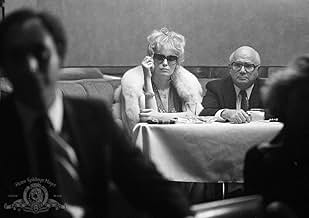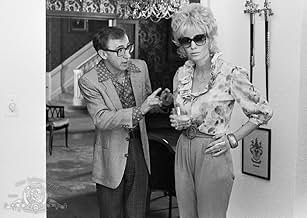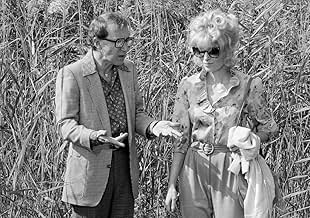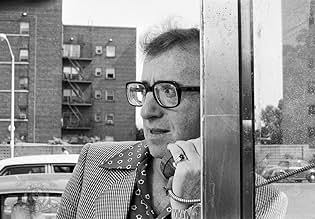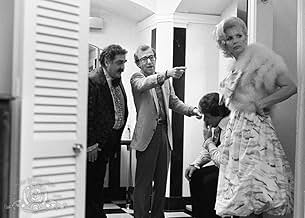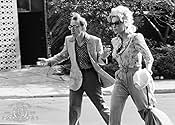Em suas tentativas de reconciliar um cantor de salão com sua amante, um infeliz agente de talentos é confundido com um amante por um gângster ciumento.Em suas tentativas de reconciliar um cantor de salão com sua amante, um infeliz agente de talentos é confundido com um amante por um gângster ciumento.Em suas tentativas de reconciliar um cantor de salão com sua amante, um infeliz agente de talentos é confundido com um amante por um gângster ciumento.
- Direção
- Roteirista
- Artistas
- Indicado a 2 Oscars
- 3 vitórias e 5 indicações no total
- Johnny's Mother
- (as Gina DeAngelis)
Avaliações em destaque
This beautifully shot film is concerned with theatrical agent, Danny Rose, a man who takes on blind xylophone players and one legged tap dancers. Terrible acts and yet Rose believes in every single one of them, no matter how badly they are doing. His big break comes with the public's newfound appetite for nostalgia, which brings egomaniac and alcoholic crooner, Lou Canova back into the public eye.
Canova flourishes and is set to make his comeback complete when he requires Rose to bring his mistress, Tina to the concert. Various complications and highjinks ensure that this is no easy task.
This is the comedy of the situation and the movie relies on this farce for its comic effect. However, what separates this from other sub-standard films is the characterisation that Allen brings to Rose. At first glance Rose is a loser, whose acts leave him as soon as they get anywhere. But the belief he has in his charges and the commitment he is prepared to put into them allows a great deal of empathy for him. Allen plays it brilliantly, allowing just the right amount of pathos and charm.
A splendid movie, full of the typical Allen one liners and with one very very funny shoot out scene with helium.
A squeaky voiced Mia Farrow disguised in a curly blonde wig and dark glasses foreshadows Mira Sorvino's performance in Mighty Aphrodite. The rest of the cast are unknown, some of the actors being real-life Jewish comedians and speciality acts. It is interesting to reflect on the interchangeability of Jewish and Italian behaviour in the film, the exaggerated emotions and the theatrical gestures. This is something that is apparent in other films such as Dirty Dancing or Moonstruck, which would have worked equally well as Jewish films or Italian films.
Allen gives one of his best performances as the hapless Danny, promoting a portfolio of one-legged tap-dancers, one-armed jugglers, balloon folders, parrot acts and glass harmonica players. He achieves a pathos which is lacking in his more autobiographical roles. The reconciliation scene at the end is reminiscent of Chaplin in City Lights.
The absolute beauty of BDR not only comes from (once again) Gordon Willis' inspired chiaroscuro use of black & white photography and framing, Allen's hand-picked jazz score, succinct editing and crafty art direction, but mostly from its marvelous cast of actors -- most esp. Mia Farrow's astounding, beautifully wrought and precise performance. Upon subsequent viewings, her character's soul literally exudes through the epidermis! On top of that, the so-called "slapstick," which initially I viewed askance, turned-out to be far subtler than its initial impact. The right-on performances by BDR's numerous sub-characters also proved to be far more meaningful and poignant then initially viewed.
And, that ending.... What an ending! It has got to be one of the most heartbreaking and romantic finale's in screen history! (I say this with no hyperbole.) I have seen BDR more than two-dozen times, and it has never failed to bring me to tears (as did "Annie Hall," "Manhattan" and, his subsequent, "Hannah and Her Sisters"). The start of the scene (with Farrow's character confronting a heartbroken Allen) is pure beauty and poetry. The finale of Allen running after Farrow through the wet and rough-n-tumble streets of New York, and his (inaudible) "forgiveness" in front of the delicatessen, is nothing less than magical!
In sum, sometimes it takes a different "perspective" in looking at a piece of art to realize that there's much more there than meets the eye. Sort of like Diane Keaton's character in "Manhattan," as she pontificated with much zeal over the "textural" qualities of the "steel cube." Only this time, no pontification is needed: "Broadway Danny Rose" is pure, unadulterated romance through and through! This is a "must-see." Enjoy!
The story of the film is told by a bunch of entertainers at the Carnegie Deli in Manhattan, reminiscing about Rose (Allen), an agent for the most obscure acts in New York back in the '50s and '60s. One of them claims to have the best Danny Rose story and his telling serves as narration to the film.
The story revolves around Rose and his biggest talent, Lou Canova (Nick Apollo Forte), an old-fashioned Italian crooner doing covers of Sinatra and all kinds of classic tunes from what back then was considered a "bygone era," but Lou is having a resurgence. Problem is he's an alcoholic and a womanizer. He insists on having the woman he's having an affair with attend his big performance at the Waldorf (that could get him a national gig). Other problem is, this Tina (Mia Farrow) was told Lou was cheating on her, so now she's run off to her Italian mob family and through strange circumstances, the mob wants to knock Danny off.
There are elements of classic comedy here, which is why the black and white works for "Danny Rose." At the same time, it's a nostalgic film (the early '80s was full of that for Allen) and an intimate one.
Without spoiling too much, the key to "Danny Rose" relies in the conflict between self- interest and dependency on others. In a way, it's Allen's way of saying thank you or perhaps apologizing to those that have been part of his personal journey.
No one does it alone, especially not Danny Rose, a character whose living is dependent on the talents and aspirations of others and who lives solely by the advice he remembers from deceased relatives. Then there's Lou, who can't perform unless Tina is there but loves his wife dearly, and then Tina, who can't make any major decision without consulting a psychic elderly woman.
"Danny Rose" has some memorable Woody Allen quotes and classically comical situations such as he and Farrow's Tina "wriggling" their way out of some ropes tying them together as a former escape artist client of Danny's used to say, or when they're chased into the Macy's Day Parade balloon warehouse.
The film is simplistic but truthful and it's nice to see Allen make a point that's so universal instead of one about affluent people solving their life crises.
The film begins with a gaggle of older Borscht Belt-caliber comedians sitting around a table at Manhattan's Carnegie Deli, trading stories about Danny Rose. Rose loves acts that are a bit "outside" the mainstream, so there is no shortage of laughs from our storytellers as they remember his one-legged tap dancer, his blind xylophonist, and so on.
After about 10 minutes or so of general reminiscing interspersed with footage of Rose portraying the stories, one man says he's got the Rose story to top them all, which launches us into the "film proper". It's a tale about Rose and his client Lou Canova (Nick Apollo Forte), a Louis Prima-styled singer who had one hit, "Agita", in the 1950s, but who is a has-been when Rose meets him. Broadway Danny Rose is primarily the story of how Rose gets mixed up in a comically deteriorating situation with Canova's mistress, Tina Vitale (Mia Farrow), while trying to ensure that she attends a career-restoring gig, despite the fact that Canova's wife is also going to be there.
Allen treats us to some entertaining postmodernist layering in the beginning. It seems like a normal enough film in the first few moments, but quickly turns into almost a mock documentary as our deli comedians talk about Rose. The Rose material is really all flashback, and even when it "takes over" the film during the Canova story, it still has a mock documentary feel at first. Eventually the Canova story proceeds as any film would, but the bookended storytellers emphasize the nostalgic tone of the film.
Allen is drilling in that fact that we're reminiscing. He wants the audience to reminisce about the tone of the main story, even if they don't have personal memories of the era or that segment of the entertainment industry. For Allen, the film has strong resemblances to some aspects of his personal experience as an up and coming standup comedian, and he even draws parallels such as a Carnegie Deli sandwich being named after Danny Rose in the film--in real life, you can eat a sandwich named after Woody Allen at the Carnegie Deli. Having characters in the film reminisce about what turns out to be a reminiscent mode in a flashback helps audience members outside of the relevant "nostalgia zone" to get into the proper mood.
Interestingly for this goal, even though Allen goes to the trouble to shoot the film in black & white, he doesn't attempt to remove blatantly anachronistic elements--as if he's trying to remind us that this is still artificial reminiscing. For example, a scene that takes place in a Times Square office features a window through which we can see the large flashing "Fuji" sign. On the other hand, Allen also exploits the fact that Broadway Danny Rose was shot just as the recent family-friendly gentrification of the New York City area was taking hold, as there are important scenes on the old, dilapidated West Side docks and in a Jersey City that still looks comparatively like a barren wasteland.
One of the reasons that this film is so charming is that even though Danny Rose is a loser, he's a good-hearted loser with an admirable philosophy of life, despite the fact that he's continually abused and/or given the short shrift by those he helps. Allen is still doing his "neurotic Jew" schtick here, but whereas he tends to draw that character as self-centered in other films, in Broadway Danny Rose he's almost completely altruistic. He actually tries to persuade other characters, who happen to be self-centered, to change their outlooks. He's a Tod Browning to a cadre of performing freaks, promoting and embracing them, even if to most eyes it has to involve exploiting them at the same time. But he admirably can't help seeing the best in everyone, encouraging them and honestly believing that they should be in a "higher position" than they are now. He even does this with the non-performing Tina when she makes some decorating suggestions about his apartment--suddenly, he wants to manage an interior decorating career for her, saying that she should be doing "hotels and embassies".
As is typical for an Allen film, Broadway Danny Rose is filled with amazing, often symbolic cinematography, by frequent collaborator (from 1977's Annie Hall through 1985's The Purple Rose of Cairo) Gordon Willis. It's also full of great performances (including Allen's) and it's infused with Allen's trademark pre-bop jazz, in this case heavily depending on variations of the Prima-like "Agita", somewhat similar to how "In A Persian Market" was used as a theme in the later Curse of the Jade Scorpion (2001).
If you like Allen's typical style, you've surely seen this film. If you're wondering where to start or dip into Allen's works further, Broadway Danny Rose is as good a place to begin as any.
Você sabia?
- CuriosidadesThe reason Mia Farrow wears sunglasses most of the film is that Woody Allen did not feel she could pass herself as a tough Italian "broad", so he had her wear the sunglasses most of the film to hide her eyes, making her seem more sultry and mysterious.
- Erros de gravaçãoIn one scene, Danny can be seen walking past a movie theater, that advertises Q - A Serpente Alada (1982) and Halloween III: A Noite das Bruxas (1982) on the marquee. However, the film is supposed to take place in the late 1960s.
- Citações
Danny Rose: You know what my philosophy of life is? That it's important to have some laughs, no question about it, but you gotta suffer a little too' because, otherwise you miss the whole point to life. And that's how I feel
Tina Vitale: Know what my philosophy of life is?
Danny Rose: I can imagine.
Tina Vitale: It's over quick, so have a good time. You see want you want, you go for it. Don't pay any attention to anyone else. And do it to the other guy first, because, if you don't, he'll do it to you.
Danny Rose: This is a philosophy of life? This is - it sounds like the screenplay to "Murder Incorporated".
- Cenas durante ou pós-créditosThe guys in the Carnegie Deli continue to banter over part of the end credits.
Principais escolhas
- How long is Broadway Danny Rose?Fornecido pela Alexa
Detalhes
- Data de lançamento
- País de origem
- Idiomas
- Também conhecido como
- Brodvejski Danny Rose
- Locações de filme
- Empresas de produção
- Consulte mais créditos da empresa na IMDbPro
Bilheteria
- Orçamento
- US$ 8.000.000 (estimativa)
- Faturamento bruto nos EUA e Canadá
- US$ 10.600.497
- Fim de semana de estreia nos EUA e Canadá
- US$ 953.794
- 29 de jan. de 1984
- Faturamento bruto mundial
- US$ 10.600.497
- Tempo de duração1 hora 24 minutos
- Cor
- Mixagem de som
- Proporção
- 1.85 : 1
Contribua para esta página



